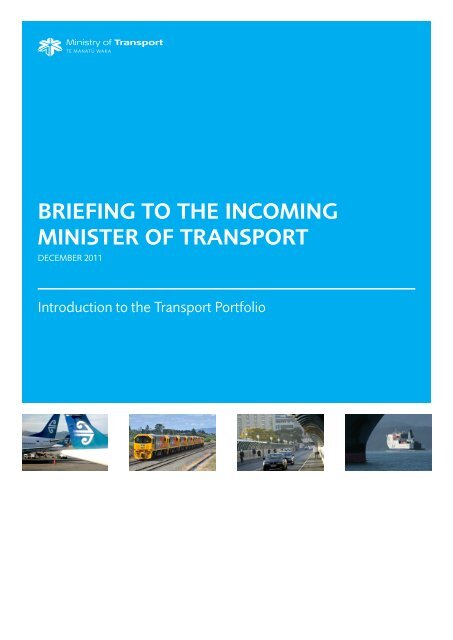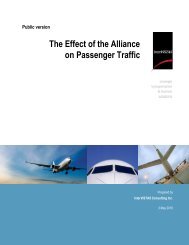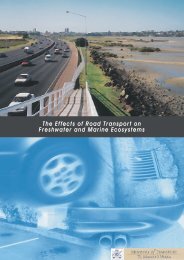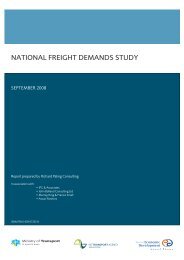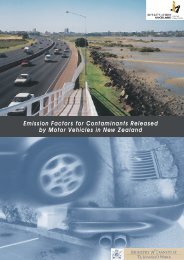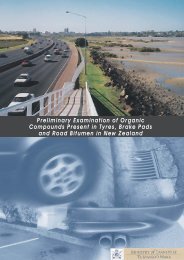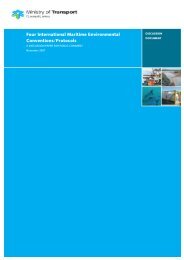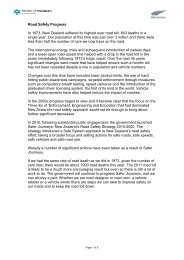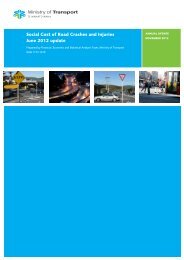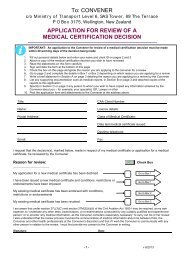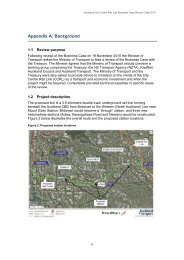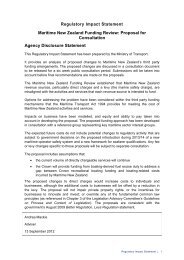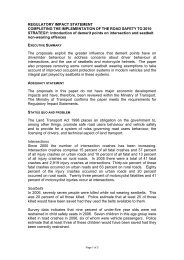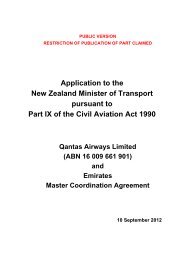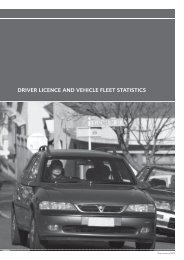Supplementary to BIM - Welcome to MoT (draft) - Ministry of Transport
Supplementary to BIM - Welcome to MoT (draft) - Ministry of Transport
Supplementary to BIM - Welcome to MoT (draft) - Ministry of Transport
Create successful ePaper yourself
Turn your PDF publications into a flip-book with our unique Google optimized e-Paper software.
BRIEFING TO THE INCOMING<br />
MINISTER OF TRANSPORT<br />
DECEMBER 2011<br />
Introduction <strong>to</strong> the <strong>Transport</strong> Portfolio
Contents<br />
Purpose ........................................................................................................... 3<br />
A responsive <strong>Ministry</strong> — serving the needs <strong>of</strong> ministers and the Government 3<br />
Section 1: The <strong>Ministry</strong> <strong>of</strong> <strong>Transport</strong> and the transport sec<strong>to</strong>r .................. 4<br />
<strong>Ministry</strong> functions .......................................................................................... 4<br />
<strong>Ministry</strong> operation and staffing ...................................................................... 4<br />
The transport sec<strong>to</strong>r ..................................................................................... 6<br />
Working with the Crown entities ................................................................... 7<br />
Other key stakeholders ................................................................................ 8<br />
The transport modes .................................................................................... 8<br />
Section 2: Legislative responsibilities ....................................................... 13<br />
Other legislative powers and functions ....................................................... 13<br />
<strong>Transport</strong> rules ........................................................................................... 13<br />
Bills currently being considered by Parliament ........................................... 14<br />
Section 3: Vote <strong>Transport</strong> ........................................................................... 15<br />
Overview .................................................................................................... 15<br />
Road tax revenue ....................................................................................... 15<br />
National Land <strong>Transport</strong> Programme and other road funding .................... 15<br />
Rail ............................................................................................................. 16<br />
Crown entities ............................................................................................. 16<br />
Other .......................................................................................................... 17<br />
Departmental outputs ................................................................................. 17<br />
Section 4: Participation in international fora ............................................. 18<br />
International governing organisations ......................................................... 18<br />
Other international organisations ................................................................ 18<br />
Appendix 1: Developing policy capability ................................................. 19<br />
Appendix 2: Legislation .............................................................................. 21<br />
Major Acts .................................................................................................. 21<br />
Major statu<strong>to</strong>ry regulations ......................................................................... 21<br />
Appendix 3: Legislation changes ............................................................... 23<br />
Appendix 4: Vote <strong>Transport</strong> non-departmental appropriations 2011/12 . 25<br />
Page 2 <strong>of</strong> 25
Purpose<br />
This briefing is designed <strong>to</strong> give you an overview <strong>of</strong> what your key responsibilities are<br />
as Minister <strong>of</strong> <strong>Transport</strong>, what the <strong>Ministry</strong> <strong>of</strong> <strong>Transport</strong> (the <strong>Ministry</strong>) does, and how<br />
the transport sec<strong>to</strong>r is structured and funded.<br />
This briefing does not set out the <strong>Ministry</strong>’s work programme. We will provide you<br />
with a copy <strong>of</strong> our Output Plan which reflects work agreed with the previous Minister.<br />
We look forward <strong>to</strong> discussions with you about how we can reflect your priorities in<br />
our work programme.<br />
A responsive <strong>Ministry</strong> — serving the needs <strong>of</strong><br />
ministers and the Government<br />
The <strong>Ministry</strong>’s role is <strong>to</strong> be a trusted, impartial and expert transport adviser <strong>to</strong> the<br />
Government. Our primary function is as a policy adviser <strong>to</strong> ministers and the<br />
Government. We will strive <strong>to</strong> provide you with our best advice at all times, and once<br />
you have taken your policy decisions, we will work conscientiously <strong>to</strong> implement<br />
those <strong>to</strong> the best <strong>of</strong> our ability.<br />
The <strong>Ministry</strong> operates as a pr<strong>of</strong>essional services organisation. This means that we<br />
utilise all <strong>of</strong> the <strong>Ministry</strong>’s staff as a single resource (avoiding silos within the <strong>Ministry</strong>)<br />
and will focus staff on your highest priority initiatives. It also means that we are able<br />
<strong>to</strong> respond immediately <strong>to</strong> new issues or changed priorities by shifting people and<br />
other resources <strong>to</strong> where they are needed. Our staff are used <strong>to</strong> working in this way<br />
and look forward <strong>to</strong> the opportunities and challenges that this brings.<br />
We have lifted our capability <strong>to</strong> provide you (and future ministers) with advice on the<br />
longer-term policy issues for transport. In addition <strong>to</strong> advice that we will provide you<br />
on current policy issues, we also have a focus on the broader issues for transport,<br />
through, for example, our sec<strong>to</strong>r reports that prompt new thinking and seek <strong>to</strong> identify<br />
future opportunities or challenges.<br />
See Appendix 1 for further information on how the <strong>Ministry</strong> is developing its policy<br />
capability.<br />
Page 3 <strong>of</strong> 25
Section 1: The <strong>Ministry</strong> <strong>of</strong> <strong>Transport</strong> and the<br />
transport sec<strong>to</strong>r<br />
<strong>Ministry</strong> functions<br />
As the Government’s principal adviser on transport policy, the vast majority <strong>of</strong> the<br />
<strong>Ministry</strong>’s work is in providing advice and ongoing support <strong>to</strong> you and the Associate<br />
<strong>Transport</strong> Minister. The <strong>Ministry</strong> provides advice in two core areas:<br />
1. Advice on transport issues and how you can achieve your goals through policy,<br />
funding and regula<strong>to</strong>ry settings.<br />
2. Advice on how <strong>to</strong> get the best out <strong>of</strong> the transport Crown entities, which play a<br />
key role in the implementation <strong>of</strong> Government policy.<br />
In addition <strong>to</strong> our core policy and Crown entity oversight roles, the <strong>Ministry</strong> also has<br />
responsibility for other functions, including:<br />
• administration <strong>of</strong> transport legislation, rules and regulations<br />
• collection <strong>of</strong> vehicle licensing fees, road user charges and fuel excise duty<br />
(contracted <strong>to</strong> the New Zealand <strong>Transport</strong> Agency)<br />
• representing New Zealand at international fora<br />
• ensuring collaboration and coordination within the parts <strong>of</strong> the public sec<strong>to</strong>r that<br />
affect the transport sec<strong>to</strong>r<br />
• licensing all international airlines operating <strong>to</strong> and from New Zealand<br />
• managing the Milford Sound/Piopiotahi Aerodrome<br />
• overseeing the Crown’s interest in joint venture airports 1<br />
• administering a contract with the Meteorological Service <strong>of</strong> New Zealand<br />
Limited (MetService) for the provision <strong>of</strong> a public weather warning and forecast<br />
service<br />
<strong>Ministry</strong> operation and staffing<br />
<strong>Ministry</strong> staff are located in the larger Head Office in Welling<strong>to</strong>n and small <strong>of</strong>fices in<br />
Christchurch and Auckland.<br />
The <strong>Ministry</strong> currently has:<br />
• 145.1 full-time equivalents<br />
• 9 vacancies<br />
• 19.91 percent annual turnover<br />
The <strong>Ministry</strong> recognised a need <strong>to</strong> reduce its costs (the <strong>Ministry</strong> is required <strong>to</strong> save<br />
$957,000 each year from 2012/13 and also meet all additional operating costs) and<br />
has been actively managing down its staffing level. We have reduced our headcount<br />
by 20.3 percent (from 182) since December 2008. The important thing for the<br />
<strong>Ministry</strong>, however, has been ensuring our flexibility <strong>to</strong> focus resources on the highest<br />
priority initiatives for the Government while also reducing staffing levels.<br />
1 Joint venture airports (JVAs) are airports operated by local authorities in partnership with the government.<br />
Page 4 <strong>of</strong> 25
<strong>Ministry</strong> Leadership Team<br />
The structure <strong>of</strong> the <strong>Ministry</strong> Leadership Team is set out in Figure 1 below.<br />
Figure 1: The <strong>Ministry</strong> Leadership Team<br />
Page 5 <strong>of</strong> 25
The transport sec<strong>to</strong>r<br />
Overview <strong>of</strong> the transport sec<strong>to</strong>r<br />
The New Zealand Government transport sec<strong>to</strong>r includes you, the Associate<br />
<strong>Transport</strong> Minister, the <strong>Ministry</strong>, four Crown entities, three state-owned enterprises,<br />
and one Crown-established trust. The functions and responsibilities are briefly<br />
outlined below.<br />
Figure 2: Overview <strong>of</strong> the New Zealand government transport sec<strong>to</strong>r<br />
Each <strong>of</strong> the transport Crown entities has a Board, appointed by you as the Minister <strong>of</strong><br />
<strong>Transport</strong>, <strong>to</strong> administer its functions as set out in legislation. The Road Safety Trust<br />
also has a Board, established by a trust deed. These entities are primarily<br />
responsible for the delivery <strong>of</strong> government activities in the transport sec<strong>to</strong>r. More<br />
detailed descriptions <strong>of</strong> each <strong>of</strong> the Crown entity’s operations will be found in their<br />
respective briefings <strong>to</strong> you.<br />
Page 6 <strong>of</strong> 25
Working with the Crown entities<br />
As the Minister, you are responsible for the Crown’s relationship with the transport<br />
Crown entities. You have a statu<strong>to</strong>ry role in participating in setting the strategic<br />
direction for each entity and in appointing a Board <strong>to</strong> deliver the entity’s functions in<br />
line with Government expectations. The Board <strong>of</strong> each entity is responsible for the<br />
entity’s overall performance. There are a range <strong>of</strong> functions that the entities exercise<br />
independently from the Government.<br />
Your primary relationship with the Crown entities will be with the Board, generally<br />
through the Chair. The most direct levers that you have available <strong>to</strong> influence entity<br />
performance are through the annual letters <strong>of</strong> expectations, decisions on the funding<br />
level <strong>of</strong> the organisation and the appointment <strong>of</strong> Board members. Our view is that a<br />
carefully selected and well-run Board, appropriate levels <strong>of</strong> funding and a clear steer<br />
from you on strategic direction should result in a high-performing organisation.<br />
The <strong>Ministry</strong> assists you <strong>to</strong> engage with each Crown entity in setting its strategic<br />
direction and targets, reviewing each Crown entity’s <strong>draft</strong> Statement <strong>of</strong> Intent and<br />
assessing its progress against agreed objectives. The <strong>Ministry</strong> will also provide you<br />
with advice on the entity performance and capability.<br />
Given the significant influence <strong>of</strong> Crown entities in the <strong>Transport</strong> portfolio, particularly<br />
the NZ <strong>Transport</strong> Agency (NZTA), we would encourage regular engagement with the<br />
Chair <strong>of</strong> each Board. Notwithstanding this, you have several formal mechanisms for<br />
managing this engagement.<br />
You communicate the Government’s expectation <strong>of</strong> strategic direction through an<br />
annual letter <strong>of</strong> expectation. The <strong>Ministry</strong> will provide you with advice on these letters<br />
following your initial discussions with the entities.<br />
Crown entity boards will report quarterly <strong>to</strong> you on the entity’s performance. You are<br />
also able <strong>to</strong> commission the <strong>Ministry</strong> <strong>to</strong> conduct reviews <strong>of</strong> the Crown entities’<br />
capability, funding, and performance on your behalf.<br />
The <strong>Ministry</strong> has a central role in ensuring collaboration and coordination within the<br />
transport sec<strong>to</strong>r. We seek <strong>to</strong> ensure that the sec<strong>to</strong>r is aligned <strong>to</strong> delivering<br />
government objectives.<br />
Page 7 <strong>of</strong> 25
Other key stakeholders<br />
Regional councils and terri<strong>to</strong>rial authorities own and manage transport infrastructure,<br />
develop local transport policy, and provide public transport services within their own<br />
areas <strong>of</strong> responsibility. As such, they are important players in the transport sec<strong>to</strong>r<br />
and it is important that central and local government work <strong>to</strong>gether in the planning,<br />
funding and delivery <strong>of</strong> transportation throughout New Zealand.<br />
The private sec<strong>to</strong>r is a major contribu<strong>to</strong>r <strong>to</strong> the operation <strong>of</strong> the transport modes and<br />
it has a significant impact on the achievement <strong>of</strong> the Government’s policy outcomes.<br />
Businesses have direct interests in a safe, reliable and sustainable transport system.<br />
They make choices that have a significant impact on the nature and direction <strong>of</strong> the<br />
demand for transport infrastructure and services.<br />
The transport modes<br />
This section is intended <strong>to</strong> provide you with an understanding <strong>of</strong> the Government’s<br />
role in each <strong>of</strong> the transport modes.<br />
Aviation<br />
The Government’s role in the aviation sec<strong>to</strong>r is largely as the policy maker and<br />
regula<strong>to</strong>r <strong>of</strong> the safety and security aspects <strong>of</strong> the sec<strong>to</strong>r. The Government also<br />
seeks <strong>to</strong> enable the adoption <strong>of</strong> new technology that has safety and economic<br />
benefits. The <strong>Ministry</strong> is responsible for aviation policy, negotiation <strong>of</strong> international air<br />
services agreements, and licensing <strong>of</strong> international airlines. It also administers the<br />
Crown’s interest in six regional airports (New Plymouth, Taupō, Westport,<br />
Whakatāne, Wanganui, and Whangārei) and currently operates the Milford<br />
Sound/Piopiotahi aerodrome in the Fiordland National Park. The Civil Aviation<br />
Authority is responsible for safety and security oversight and the Aviation Security<br />
Service provides security functions at airports.<br />
International air services are governed by treaty-level bilateral and multilateral air<br />
services agreements with other states. New Zealand has a liberal approach.<br />
International Air Service Licences are a statu<strong>to</strong>ry requirement and primarily prescribe<br />
the routes and capacity that may be operated by the airline concerned. You are the<br />
licensing authority for New Zealand international airlines, and the Chief Executive <strong>of</strong><br />
the <strong>Ministry</strong> is the licensing authority for services <strong>to</strong> and from countries with which<br />
open aviation market arrangements have been negotiated.<br />
Ownership <strong>of</strong>, and investment in, aviation infrastructure and air services is a mixture<br />
<strong>of</strong> private, State-owned enterprises and council or Crown shareholdings or interests.<br />
The air-traffic system and most airports have been corporatised or placed in<strong>to</strong><br />
council-controlled organisations. The Crown has 100 percent shareholding in the air<br />
traffic services provided by the Airways Corporation <strong>of</strong> New Zealand Ltd, and the<br />
majority shareholding (74 percent) in Air New Zealand Ltd. The Crown retains up <strong>to</strong><br />
50 percent shareholdings in Christchurch International Airport Ltd, Dunedin Airport<br />
Ltd, Hawke’s Bay Airport Ltd and Invercargill Airport Ltd. These Crown interests are<br />
all managed by the Treasury.<br />
Page 8 <strong>of</strong> 25
Maritime<br />
The Government’s key role in the maritime sec<strong>to</strong>r is as the policy maker and safety<br />
regula<strong>to</strong>r <strong>of</strong> all maritime activity that occurs in New Zealand. Maritime New Zealand<br />
has responsibility for this regula<strong>to</strong>ry oversight. Port ownership is largely the preserve<br />
<strong>of</strong> local authorities with limited private-sec<strong>to</strong>r ownership in some port companies. The<br />
Southport (Bluff), Lyttel<strong>to</strong>n and Tauranga port companies are traded on the New<br />
Zealand S<strong>to</strong>ck Exchange. The efficient operation <strong>of</strong> the port sec<strong>to</strong>r is critical <strong>to</strong> New<br />
Zealand’s export and import industries, and therefore <strong>to</strong> economic performance.<br />
Domestic sea freight is moved through a mix <strong>of</strong> New Zealand operated and<br />
internationally operated ships. Coastal shipping is regulated by the Maritime<br />
<strong>Transport</strong> Act. Section 198 <strong>of</strong> this Act restricts the services that foreign ships can<br />
provide in coastal shipping.<br />
Rail<br />
Freight<br />
New Zealand Railways Corporation (KiwiRail) is a State-owned enterprise consisting<br />
<strong>of</strong> the rail freight business, the infrastructure group, the passenger group (such as<br />
Tranz Metro, Tranz Scenic) and the ferry group (Interislander).<br />
KiwiRail is implementing a 10 year Turnaround Plan, <strong>to</strong> become a sustainable freight<br />
business. The Government has committed <strong>to</strong> providing seed funding <strong>of</strong> $750 million<br />
for the first 3 years <strong>of</strong> the $4.6 billion plan, with the majority <strong>of</strong> the investment coming<br />
from business revenues. The approval <strong>of</strong> the final $250 million tranche <strong>of</strong> seed<br />
funding is due in the 2012 Budget.<br />
The financial performance <strong>of</strong> KiwiRail is the responsibility <strong>of</strong> the Ministers <strong>of</strong> Finance<br />
and State-owned enterprises. Advice on KiwiRail’s financial performance is provided<br />
by the Crown Ownership Moni<strong>to</strong>ring Unit within the Treasury, with the <strong>Ministry</strong><br />
providing a second opinion and supporting advice. You, however, are responsible for<br />
moni<strong>to</strong>ring the economic impact <strong>of</strong> investment in KiwiRail under the Turnaround Plan,<br />
and the <strong>Ministry</strong> takes the lead in providing this advice.<br />
Metro rail<br />
Welling<strong>to</strong>n and Auckland regions run metro rail services as part <strong>of</strong> their public<br />
transport network. Central government, through KiwiRail, owns and maintains the<br />
network. Currently, the Crown is also funding significant infrastructure upgrades in<br />
both Welling<strong>to</strong>n and Auckland.<br />
Cabinet agreed in 2009 <strong>to</strong> fund metro rail capital projects directly from Crown funds<br />
rather than the National Land <strong>Transport</strong> Fund (NLTF). Consequently, consideration<br />
<strong>of</strong> major new metro rail capital projects is primarily a role for the <strong>Ministry</strong>, not the<br />
NZTA.<br />
During 2011, metro rail ownership, funding and operating issues have been agreed<br />
with Greater Welling<strong>to</strong>n Regional Council and Auckland Council.<br />
Each agreement includes Government funding for infrastructure (including Auckland<br />
electrification) and rolling-s<strong>to</strong>ck upgrades. Ownership <strong>of</strong> rolling s<strong>to</strong>ck is now vested<br />
with the region with core infrastructure remaining with KiwiRail. An operating subsidy<br />
from the NLTF ensures the regions pay an appropriate track access charge as part <strong>of</strong><br />
operating costs <strong>to</strong> KiwiRail.<br />
Page 9 <strong>of</strong> 25
These arrangements ensure that the responsibilities for metro rail are clearly defined<br />
and operating and capital costs are appropriately funded by passengers, local<br />
government, the NLTF and central government.<br />
In the future, the Government’s involvement in metro rail will be focused on funding<br />
and evaluating new metro rail capital project bids for Crown funding.<br />
The <strong>Ministry</strong>’s oversight <strong>of</strong> KiwiRail includes the management <strong>of</strong> capital bids through<br />
the Budget process and the overview <strong>of</strong> the metro operations <strong>to</strong> ensure that they are<br />
being managed on a sustainable business basis.<br />
Road<br />
The Government owns and fully funds the State highway network. The NZTA is the<br />
Crown entity responsible for the allocation <strong>of</strong> central government funding through the<br />
NLTF and for construction and maintenance <strong>of</strong> the State highways. Most other roads<br />
(local roads) are owned by local councils and funded jointly by local and central<br />
government. 2<br />
The Government also sets the rules by which all users can access and use the<br />
roading network. This includes determining road user requirements, including driver<br />
and opera<strong>to</strong>r licensing standards, and mo<strong>to</strong>r vehicle safety and environmental<br />
standards.<br />
The Land <strong>Transport</strong> Management Act 2003<br />
The Land <strong>Transport</strong> Management Act 2003 (LTMA) is the main transport planning<br />
and funding statute. Two other relevant key Acts are the Local Government Act 2002<br />
and the Resource Management Act 1991.<br />
The LTMA provides the framework for the allocation <strong>of</strong> central government funding<br />
for State highways, local roads and public transport services, and the associated<br />
planning processes. These activities are delivered by regional councils, city/district<br />
councils and the NZTA (using private-sec<strong>to</strong>r contrac<strong>to</strong>rs). The NZTA is statu<strong>to</strong>rily<br />
independent in relation <strong>to</strong> making individual project and procurement decisions.<br />
The revenue for land transport comes mostly from road users through fuel excise<br />
duty (petrol tax), charges on diesel and heavy vehicles (road user charges) and<br />
vehicle licensing and registration charges. The LTMA hypothecates, or reserves, this<br />
revenue for land transport purposes in the NLTF. Local government also contributes<br />
an average <strong>of</strong> 50 percent <strong>of</strong> the cost <strong>of</strong> its land transport activities from rates and<br />
borrowing. This contribution is known as the local share. Other sources <strong>of</strong> revenue,<br />
including <strong>to</strong>lling, are also available under the LTMA.<br />
Government Policy Statement<br />
The Government Policy Statement on Land <strong>Transport</strong> Funding (GPS) is the major<br />
lever available <strong>to</strong> Government for influencing how and where investment in the land<br />
transport system is made by the NZTA and local government, and how revenue will<br />
be raised. The GPS is your document. When you issue the GPS you can decide how<br />
much <strong>to</strong> allocate <strong>to</strong> activities such as new and improved infrastructure for State<br />
highways, and public transport.<br />
2 There are some Crown-owned roads, such as those providing access <strong>to</strong> ski fields, on<br />
Department <strong>of</strong> Conservation land.<br />
Page 10 <strong>of</strong> 25
The GPS is issued every 3 years on a time frame which enables it <strong>to</strong> inform local<br />
governments’ 3-year planning cycle. The current GPS (GPS 2009) was issued in<br />
May 2009 and will continue <strong>to</strong> be in force until 30 June 2012.<br />
The NZTA must give effect <strong>to</strong> the GPS as it administers the NLTF. To do so, the<br />
NZTA develops a 3-yearly National Land <strong>Transport</strong> Programme.<br />
From 1 July 2012, a new GPS (the GPS 2012) will come in<strong>to</strong> effect. The GPS 2012<br />
was released in July 2011 <strong>to</strong> guide the development <strong>of</strong> the next National Land<br />
<strong>Transport</strong> Programme and regional planning documents.<br />
The GPS 2012 will make around $2.95 billion available in 2012/13 for investment in<br />
the land transport sec<strong>to</strong>r, rising <strong>to</strong> $3.25 billion in 2014/15. Over a 10-year period, the<br />
GPS 2012 makes around $36 billion available for land transport.<br />
The GPS 2012 builds on and advances the long-term programme <strong>of</strong> change put in<br />
place by the current GPS (GPS 2009). The GPS 2012 has three focus areas or<br />
priorities, which are <strong>to</strong> direct land transport investment in<strong>to</strong> activities that:<br />
• support economic growth and productivity<br />
• achieve strong value for money<br />
• improve road safety.<br />
Figure 3 below illustrates how the GPS provides direction for investment in land<br />
transport.<br />
Figure 3: New Zealand’s land transport planning and funding regime<br />
Page 11 <strong>of</strong> 25
Public transport, walking and cycling<br />
The Government has a role in regulating how public transport services are provided<br />
and funded in New Zealand, and provides funding for public transport services and<br />
infrastructure through the NLTF. The Government also provides funding for other<br />
related initiatives such as the SuperGold Card <strong>of</strong>f-peak travel scheme.<br />
Public transport services are regulated under the Public <strong>Transport</strong> Management Act<br />
2008. This Act confers powers <strong>to</strong> regional councils <strong>to</strong> set standards for public<br />
transport services provided in their regions, and helps regional councils and the<br />
NZTA obtain the best value for money in achieving an affordable, integrated, safe,<br />
responsive and sustainable public transport system.<br />
Over the last 10 years, increases in government spending on public transport have<br />
not been met with commensurate increases in public transport patronage. The<br />
<strong>Ministry</strong> has been working with the public transport sec<strong>to</strong>r <strong>to</strong> develop a new public<br />
transport operating model for bus and ferry services <strong>to</strong> help close the gap between<br />
funding and patronage growth.<br />
At present, walking is a key part <strong>of</strong> most transport journeys in New Zealand, with<br />
cycling making a relatively small contribution. Both walking and cycling can make a<br />
significant contribution <strong>to</strong> initiatives that aim <strong>to</strong> improve health and physical activity<br />
and reduce emissions. The Government currently supports walking and cycling<br />
through NLTF investment in initiatives that contribute <strong>to</strong> congestion relief, improve<br />
pedestrian and cyclist safety, and walking and cycling infrastructure.<br />
Page 12 <strong>of</strong> 25
Section 2: Legislative responsibilities<br />
The <strong>Ministry</strong> administers more than 24 pieces <strong>of</strong> primary legislation, many<br />
regulations, and land transport, civil aviation, maritime, and marine protection rules.<br />
You have various functions and powers under primary legislation; including the<br />
appointment <strong>of</strong> members <strong>of</strong> Crown entity Boards, approval <strong>of</strong> plans, approval <strong>of</strong><br />
forms, and approval <strong>of</strong> equipment. Many <strong>of</strong> your powers may be delegated in<br />
accordance with section 28 <strong>of</strong> the State Sec<strong>to</strong>r Act 1988.<br />
Other legislative powers and functions<br />
As Minister <strong>of</strong> <strong>Transport</strong>, you have:<br />
• powers in relation <strong>to</strong> the transportation <strong>of</strong> coastal cargo (Maritime <strong>Transport</strong><br />
Act)<br />
• power <strong>to</strong> notify a major maritime event where special enforcement powers are<br />
exercisable (Maritime <strong>Transport</strong> Act)<br />
• power <strong>to</strong> give directions <strong>to</strong> Maritime New Zealand, a regional council, or an<br />
on-scene commander if expedient <strong>to</strong> do so in the circumstances (Maritime<br />
<strong>Transport</strong> Act)<br />
• the ability <strong>to</strong> amend, replace, or disallow bylaws if they are inconsistent with an<br />
enactment or are unreasonable or undesirable in so far as a bylaw relates <strong>to</strong>, or<br />
may affect, traffic (Land <strong>Transport</strong> Act)<br />
• power <strong>to</strong> require screening, searching, and seizing <strong>to</strong> enhance aviation security<br />
(Civil Aviation Act)<br />
• power <strong>to</strong> grant scheduled international air service licences, and <strong>to</strong> suspend or<br />
revoke licences (Civil Aviation Act)<br />
• powers in respect <strong>of</strong> the establishment, maintenance and operation <strong>of</strong><br />
aerodromes and facilities (Civil Aviation Act )<br />
• power <strong>to</strong> establish, maintain, and operate a search and rescue co-ordination<br />
centre (Civil Aviation Act)<br />
• full powers <strong>of</strong> control <strong>of</strong> all government roads (Government Roading Powers<br />
Act 1989)<br />
• screening and searching powers <strong>to</strong> enhance maritime security (Maritime<br />
Security Act 2004)<br />
• powers <strong>of</strong> investigation and direction in relation <strong>to</strong> unfair practices (Shipping Act<br />
1987)<br />
• responsibility for completing a national land transport strategy and for issuing a<br />
new government policy statement in advance <strong>of</strong> the expiry <strong>of</strong> the current<br />
National Land <strong>Transport</strong> Programme (Land <strong>Transport</strong> Management Act 2003)<br />
A full list <strong>of</strong> current transport Acts, and regulations is attached as Appendix 2.<br />
<strong>Transport</strong> rules<br />
<strong>Transport</strong> rules are delegated legislation, developed by the NZTA, the Civil Aviation<br />
Authority, and Maritime New Zealand with assistance from the <strong>Ministry</strong>. They are a<br />
key means <strong>of</strong> legislating in the transport sec<strong>to</strong>r.<br />
Under the Land <strong>Transport</strong> Act 1998, the Civil Aviation Act 1990, the Maritime<br />
<strong>Transport</strong> Act 1994 and the Railways Act 2005, as Minister you may make ‘ordinary’<br />
rules (as opposed <strong>to</strong> emergency rules). You may not delegate this power.<br />
Page 13 <strong>of</strong> 25
An annual rules programme is prepared by the <strong>Ministry</strong> with input from the relevant<br />
transport agencies each year and your agreement is sought in March for the<br />
following year. This is generally agreed by Cabinet.<br />
Appendix 3 lists the Acts, regulations and rules that were made during the 2010/11<br />
year and the 2011/12 year <strong>to</strong> date.<br />
Bills currently being considered by Parliament<br />
The only transport legislation currently in the legislative process is the Road User<br />
Charges Bill which is part way through the whole House stage. This Bill has been<br />
under development since 2009. The previous Government had indicated that a new<br />
road user charges system would be in operation by mid-2012.<br />
The <strong>Ministry</strong> is currently in the process <strong>of</strong> <strong>draft</strong>ing legislation on the LTMA and the<br />
Public <strong>Transport</strong> Operating Model. Both pieces <strong>of</strong> legislation were due for<br />
introduction in 2012.<br />
Page 14 <strong>of</strong> 25
Section 3: Vote <strong>Transport</strong><br />
Overview<br />
You are accountable for appropriations in Vote <strong>Transport</strong> <strong>to</strong>talling $4.6 billion in<br />
2011/12.<br />
Appendix 4 provides a detailed breakdown <strong>of</strong> the Vote by appropriation type.<br />
Below is an explanation <strong>of</strong> the breakdown <strong>of</strong> the Vote by recipient:<br />
Recipients <strong>of</strong> funding $000<br />
National Land <strong>Transport</strong> Programme and other road funding 3,415,739<br />
Rail 1,046,909<br />
Crown entities 22,991<br />
Other 114,784<br />
Sub <strong>to</strong>tal 4,600,423<br />
Department 54,291<br />
Total $4,654,714<br />
Road tax revenue<br />
Road tax revenue is forecast <strong>to</strong> be $2.8 billion in 2011/12. The vast majority <strong>of</strong> road<br />
tax revenue ($2.5 billion) is fully hypothecated <strong>to</strong> the NLTF. $298 million <strong>of</strong> road tax<br />
revenue is allocated <strong>to</strong> Vote Police for road policing and $7 million is allocated <strong>to</strong><br />
search and rescue activities.<br />
National Land <strong>Transport</strong> Programme and other road<br />
funding<br />
The road tax revenue collected is allocated by permanent legislative authority (PLA)<br />
as required <strong>to</strong> deliver the National Land <strong>Transport</strong> Programme in line with the current<br />
GPS. In addition, there is some short-term funding from the Crown for roading.<br />
Appropriation 2011/12<br />
$000<br />
National Land <strong>Transport</strong> Programme PLAs<br />
Operating 1,799,000<br />
Capital 674,451<br />
Crown funding <strong>to</strong> the National Land <strong>Transport</strong> Programme 12,288<br />
Sub <strong>to</strong>tal 2,485,739<br />
Short-term loan facilities 930,000<br />
Total funding 3,415,739<br />
Page 15 <strong>of</strong> 25
The National Land <strong>Transport</strong> Programme is a 3-year programme. To allow the NZTA<br />
flexibility <strong>to</strong> manage cash flow pressures over the year, the Crown has approved two<br />
short-term loan facilities, shown in the previous table, as they will be repaid from<br />
future road tax revenue.<br />
The short-term loan facilities above represent facilities <strong>of</strong> $250 million and $90 million<br />
respectively (a <strong>to</strong>tal <strong>of</strong> $340 million). They provide flexibility <strong>to</strong> the NZTA <strong>to</strong> manage<br />
large contracts within approved funding and cash flows. The <strong>to</strong>tal appropriation<br />
shown in the table is $930 million because it is intended that the NZTA repay the loan<br />
as cash balances allow, and then redraw it as required. The appropriations are based<br />
on the drawdowns made, excluding any repayments, and so are greater than the<br />
maximum loan balance <strong>of</strong> $340 million.<br />
Rail<br />
Appropriation 2011/12<br />
$000<br />
KiwiRail Turnaround Plan 250,000<br />
Funding for particular projects 343,139<br />
Other funding 3,770<br />
Sub <strong>to</strong>tal 596,909<br />
Loan funding 450,000<br />
Total funding 1,046,909<br />
The Government has committed $750 million over 3 years <strong>to</strong> the KiwiRail Turnaround<br />
Plan. The funding above is the second tranche <strong>of</strong> $250 million. The third tranche is<br />
expected <strong>to</strong> be appropriated as part <strong>of</strong> Budget 2012.<br />
The project funding is for various ongoing but finite projects — the most significant <strong>of</strong><br />
which are the ongoing metro rail works in Auckland ($202 million) and Welling<strong>to</strong>n<br />
($126 million).<br />
There are two elements <strong>to</strong> the loan funding.<br />
• $250 million relates <strong>to</strong> the rollover <strong>of</strong> existing loans <strong>to</strong> KiwiRail.<br />
• The other $200 million is the first year <strong>of</strong> the $500 million funding <strong>to</strong> introduce<br />
electric multiple units <strong>to</strong> Auckland. The loan is <strong>to</strong> Auckland <strong>Transport</strong>.<br />
Crown entities<br />
Appropriation 2011/12<br />
$000<br />
Maritime New Zealand and other search and rescue agencies 13,436<br />
<strong>Transport</strong> Accident Investigation Commission 3,865<br />
Aviation Security Service 448<br />
Civil Aviation Authority 2,219<br />
NZ <strong>Transport</strong> Agency 3,023<br />
Total 22,991<br />
The majority <strong>of</strong> the transport Crown entity funding comes from fees and levies from<br />
third parties.<br />
Page 16 <strong>of</strong> 25
Other<br />
Appropriation 2011/12<br />
$000<br />
Met Service <strong>of</strong> New Zealand — weather forecasts and warnings 18,574<br />
SuperGold Card concessions and administration 23,000<br />
Mo<strong>to</strong>r Vehicle Register (MVR) 40,866<br />
Bad debt provision — MVR and road user charges 6,000<br />
Membership <strong>of</strong> international organisations 743<br />
Joint venture airport funding 601<br />
Rena/Maritime oil response 25,000<br />
Total 114,784<br />
Departmental outputs<br />
Appropriation 2011/12<br />
$000<br />
Policy advice 29,944<br />
Governance and performance advice for Crown agencies 1,048<br />
Land <strong>Transport</strong> revenue forecasting and strategy 1,955<br />
Search and Rescue PLA 1,136<br />
Milford Sound / Piopiotahi aerodrome operation 200<br />
Sub <strong>to</strong>tal 34,283<br />
Road user charges collection, investigation and enforcement 18,829<br />
Fuel excise duty refund administration 429<br />
Total 53,541<br />
Page 17 <strong>of</strong> 25
Section 4: Participation in international fora<br />
You and the <strong>Ministry</strong> have involvement in a range <strong>of</strong> international organisations and<br />
fora, including those listed below.<br />
As Minister, you may choose <strong>to</strong> attend the following forums/conventions.<br />
International <strong>Transport</strong> Forum (ITF)<br />
The ITF is an inter-governmental organisation within the Organisation for Economic<br />
Co-operation and Development (OECD) family. Its aim is <strong>to</strong> foster a deeper<br />
understanding <strong>of</strong> the essential role played by transport in the economy and<br />
society. There is an annual meeting <strong>of</strong> <strong>Transport</strong> Ministers in Leipzig, Germany.<br />
Standing Council on <strong>Transport</strong> and Infrastructure (SCOTI)<br />
The SCOTI is largely a forum <strong>of</strong> <strong>Transport</strong> Ministers from Federal and<br />
Commonwealth governments in Australia. New Zealand has member status, but<br />
does not vote on matters pertaining <strong>to</strong> Australian domestic issues. The next meeting<br />
is scheduled for 18 May 2012 in South Australia.<br />
International governing organisations<br />
International Civil Aviation Organization (ICAO)<br />
The ICAO sets standards and recommended practices in 18 Annexes <strong>to</strong> the<br />
Convention on International Civil Aviation (Chicago Convention) <strong>to</strong> achieve global<br />
uniformity. The <strong>Ministry</strong> is the State representative and pays New Zealand’s annual<br />
assessment. The ICAO creates many rules and sets standards for international<br />
aviation.<br />
International Maritime Organization (IMO)<br />
The IMO is a specialised agency <strong>of</strong> the United Nations with 168 member States. The<br />
IMO's main task has been <strong>to</strong> develop and maintain a comprehensive regula<strong>to</strong>ry<br />
framework for shipping. The IMO sets the rules for how shipping operates<br />
internationally.<br />
Other international organisations<br />
General Agreement on Trade in Services/World Trade Organization<br />
(GATS/WTO)<br />
GATS has limited coverage <strong>of</strong> the land transport sec<strong>to</strong>r. However, under the Annex<br />
on Air <strong>Transport</strong> Services, GATS principles can apply <strong>to</strong> computer reservation<br />
systems, aircraft repair and maintenance, and the sale and marketing <strong>of</strong> airline<br />
services.<br />
Asia-Pacific Economic Cooperation (APEC)<br />
The <strong>Transport</strong>ation Working Group <strong>of</strong> APEC usually meets biannually <strong>to</strong> work<br />
<strong>to</strong>wards trade liberalisation and facilitation in the transport sec<strong>to</strong>r, economic and<br />
technical assistance, and capacity building.<br />
Page 18 <strong>of</strong> 25
Appendix 1: Developing policy capability<br />
In 2010, Dr Graham Scott led a review <strong>to</strong> provide advice <strong>to</strong> the Government on the<br />
cost and quality <strong>of</strong> policy advice, as well as the alignment between policy expenditure<br />
and the Government's priorities.<br />
In responding <strong>to</strong> the review report, the Government has required all policy advising<br />
agencies <strong>to</strong> report <strong>to</strong> incoming ministers as follows.<br />
• A status report on the agency’s policy capability.<br />
• A list <strong>of</strong> actions the agency needs <strong>to</strong> take <strong>to</strong> improve policy performance, and a<br />
plan <strong>to</strong> complete this work.<br />
• A proposed policy work plan for the upcoming term.<br />
• A capability plan <strong>to</strong> ensure the agency can deliver on the proposed work plan.<br />
The <strong>Ministry</strong>’s policy capability and how we are<br />
improving policy performance<br />
Approximately two thirds <strong>of</strong> the <strong>Ministry</strong>’s staff are involved in the development <strong>of</strong><br />
policy advice with the remainder <strong>of</strong> staff engaged in business services functions.<br />
Over the past year, the <strong>Ministry</strong> has produced high-quality work on a number <strong>of</strong><br />
projects which have involved the resolution <strong>of</strong> some difficult issues. For example, the<br />
Auckland City Centre Rail Link Review, the Public <strong>Transport</strong> Operating Model and<br />
the metro rail projects all involved complex policy issues and extensive stakeholder<br />
engagement.<br />
Reviews show that our advice can be <strong>of</strong> high quality but the quality <strong>of</strong> our papers is<br />
not always consistent. We are also focusing on reducing costs.<br />
Over the past 2 years, the <strong>Ministry</strong>’s focus has been on creating a more flexible<br />
organisation that is closely aligned <strong>to</strong> the Government’s priorities. We believe we<br />
have achieved that, and our focus is now on developing the <strong>Ministry</strong> as a first class<br />
policy shop. To do this, we are implementing the following.<br />
Driving down the cost <strong>of</strong> our policy advice<br />
We are focusing on our cost structures and have taken decisions <strong>to</strong> disestablish a<br />
policy manager position and reduce the number <strong>of</strong> principal adviser positions within<br />
our policy teams from 20 <strong>to</strong> 14. We are also focussing on reducing costs across the<br />
organisation and have disestablished a general manager and a manager position<br />
from our business services areas and are continuing <strong>to</strong> review the costs <strong>of</strong> these<br />
services.<br />
Lifting the quality <strong>of</strong> our policy advice<br />
We are one <strong>of</strong> a number <strong>of</strong> agencies that have the quality <strong>of</strong> our policy advice<br />
audited by the New Zealand Institute <strong>of</strong> Economic Research (NZIER). We have<br />
concluded that the quality <strong>of</strong> our highest priority policy work is good. However, we<br />
need <strong>to</strong> deliver that quality <strong>of</strong> work on a much more consistent basis. We are<br />
focusing our policy capability work around the pr<strong>of</strong>essional development <strong>of</strong> our staff<br />
and ensuring that we become more consistent in the quality <strong>of</strong> advice that we<br />
provide.<br />
Page 19 <strong>of</strong> 25
We have also increased our focus on developing advice about the big issues for<br />
transport through the development <strong>of</strong> ‘sec<strong>to</strong>r reports’ which aim <strong>to</strong> identify challenges<br />
and opportunities across the transport sec<strong>to</strong>r.<br />
Enhancing our management and leadership<br />
We have undertaken individual assessments <strong>of</strong> all managers’ capabilities and<br />
established higher performance expectations, in order <strong>to</strong> lift our management and<br />
leadership performance <strong>to</strong> be in line with a first rate policy advising agency. We have<br />
also created a Policy Leadership Group chaired by the deputy chief executive <strong>to</strong><br />
drive excellence in policy analysis and advice.<br />
Proposed policy work plan(s) for the upcoming term<br />
We would like <strong>to</strong> discuss our policy work plan for the upcoming term with you <strong>to</strong><br />
ensure that it reflects your priorities. We will work with your <strong>of</strong>fice <strong>to</strong> schedule this<br />
discussion with you as early as possible.<br />
Capability plan<br />
The <strong>Ministry</strong> is currently developing a plan for implementing the actions identified<br />
above over the next 2 years. The plan will be completed by Christmas and we will<br />
report <strong>to</strong> you on it early in 2012.<br />
Page 20 <strong>of</strong> 25
Appendix 2: Legislation<br />
Major Acts<br />
The Airport Authorities Act 1966<br />
The Auckland Harbour Bridge Authority Dissolution Act 1983<br />
The Auckland Airport Act 1987<br />
The Welling<strong>to</strong>n Airport Act 1990<br />
The Christchurch-Lyttel<strong>to</strong>n Road Tunnel Authority Dissolution Act 1978<br />
The New Zealand National Airways Corporation Dissolution Act 1978<br />
Civil Aviation Act 1990<br />
Cus<strong>to</strong>ms Law Act 1908<br />
Land <strong>Transport</strong> Act 1998<br />
Land <strong>Transport</strong> Management Act 2003<br />
Maritime Security Act 2004<br />
Maritime <strong>Transport</strong> Act 1994<br />
Meteorological Services Act 1990<br />
Port Companies Act 1998<br />
Public <strong>Transport</strong> Management Act 2008<br />
Railways Act 2005<br />
Road User Charges Act 1977<br />
Ship Registration Act 1992<br />
Shipping Act 1987<br />
Submarine Cables and Pipelines Protection Act 1996<br />
Taranaki Harbours Act 1965<br />
Government Roading Powers (called Transit New Zealand Act until 1 August 2008)<br />
<strong>Transport</strong> Accident Investigation Commission Act 1990<br />
Waterfront Industry Restructuring Act 1989<br />
Major statu<strong>to</strong>ry regulations<br />
Airport Authorities (Airport Companies Information Disclosure) Regulations 1999<br />
Carriage by Air (New Zealand Currency Equivalents) Notice (No 2) 1998<br />
Civil Aviation (Aeronautical Information Service) Levies Order 2001<br />
Civil Aviation (Cape Town Convention and Aircraft Pro<strong>to</strong>col Declarations) Order 2010<br />
Civil Aviation Charges Regulations (No 2) 1991<br />
Civil Aviation (ANZA Mutual Recognition Agreement) Order 2007<br />
Civil Aviation (Offences) Regulations 1997<br />
Civil Aviation (Safety) Levies Order 2002<br />
Direction <strong>to</strong> Require Screening Notice 2007<br />
Engine Drivers’ Examination Regulations 1952<br />
Foreshore Licence Regulations 1960<br />
Heavy Vehicle Regulations 1974<br />
Land <strong>Transport</strong> (Administrative Fees for Recovery <strong>of</strong> Unpaid Tolls) Regulations 2008<br />
Land <strong>Transport</strong> (Approved Labora<strong>to</strong>ry and Analyst in Charge) Notice 2000<br />
Land <strong>Transport</strong> (Assessment Centre and Accident Report Fees) Regulations 1998<br />
Land <strong>Transport</strong> (Breath Tests) Notice 2009<br />
Land <strong>Transport</strong> (Certification and Other Fees) Regulations 1999<br />
Land <strong>Transport</strong> (Driver Licensing and Driver Testing Fees) Regulations 1999<br />
Land <strong>Transport</strong> (Driver Licensing) Rule 1999<br />
Land <strong>Transport</strong> (Infringement and Reminder Notices) Regulations 1998<br />
Land <strong>Transport</strong> (Mo<strong>to</strong>r Vehicle Registration and Licensing) Regulations 2011<br />
Land <strong>Transport</strong> (Offences and Penalties) Regulations 1999<br />
Land <strong>Transport</strong> (Ordering a Vehicle <strong>of</strong>f the Road) Notice 1999<br />
Page 21 <strong>of</strong> 25
Land <strong>Transport</strong> (Requirements for S<strong>to</strong>rage and Towage <strong>of</strong> Impounded Vehicles)<br />
Regulations 1999<br />
Land <strong>Transport</strong> (Road User) Rule 2004<br />
Land <strong>Transport</strong> (S<strong>to</strong>rage and Towage Fees for Impounded Vehicles) Regulations<br />
1999<br />
Land <strong>Transport</strong> (Trade Plates) Notice 2011<br />
Land <strong>Transport</strong> Management (Apportionment and Refund <strong>of</strong> Excise Duty and Excise-<br />
Equivalent Duty) Regulations 2004<br />
Land <strong>Transport</strong> Management (Road Tolling Scheme for ALPURT B2) Order 2005<br />
Marine Protection (Offences) Regulations 1998<br />
Marine Safety Charges Regulations 2000<br />
Maritime (Offences) Regulations 1998<br />
Maritime Security Regulations 2004<br />
Maritime Security (Designated Authority) Order 2004<br />
Maritime Security (Maritime Security Organisations) Order 2004<br />
Maritime <strong>Transport</strong> Act (Conventions) Order 1994<br />
Maritime <strong>Transport</strong> (Certificates <strong>of</strong> Insurance) Regulations 2005<br />
Maritime <strong>Transport</strong> (Fund Convention) Levies Order 1996<br />
Maritime <strong>Transport</strong> (Infringement Fees for Offences Relating <strong>to</strong> Major Maritime<br />
Events) Regulations 1999<br />
Maritime <strong>Transport</strong> (Marine Protection Conventions) Order 1999<br />
Maritime <strong>Transport</strong> (Maximum Amounts <strong>of</strong> Liability for Pollution Damage) Order 2003<br />
New Zealand Railways Corporation (Staff) Regulations 1982<br />
Notice <strong>of</strong> Direction <strong>to</strong> Require Screening 2002<br />
Oil Pollution Levies Order 1998<br />
Railways Regulations 2008<br />
Road User Charges (Rates) Order 2008<br />
Road User Charges Regulations 1978<br />
Ship Registration (Fees) Regulations 1992<br />
Shipping (Charges) Regulations 2000<br />
Submarine Cables and Pipelines Protection Order 2006<br />
Submarine Cables and Pipelines Protection (Tui Area Development) Order 2007<br />
Submarine Cables and Pipelines Protection (Kupe Gas Project) Order 2008<br />
Submarine Cables and Pipelines Protection (Maari Development) Order 2008<br />
Submarine Cables and Pipelines Protection Order 2009<br />
Traffic Regulations 1976<br />
<strong>Transport</strong> (Vehicular Traffic Road Closure) Regulations 1965<br />
<strong>Transport</strong> (Towage Fees) Notice 2004<br />
<strong>Transport</strong> Services Licensing Regulations 1989<br />
Page 22 <strong>of</strong> 25
Appendix 3: Legislation changes<br />
The following Acts were passed during the 2010/11 year.<br />
Title<br />
Civil Aviation (Cape Town Convention and Other Matters) Amendment Act 2010<br />
Land <strong>Transport</strong> (Road Safety and Other Matters) Amendment Act 2011<br />
The following regulations were made during the 2010/11 year.<br />
Title<br />
Canterbury Earthquake (Land <strong>Transport</strong> Rule: Opera<strong>to</strong>r Licensing) Order 2011<br />
Canterbury Earthquake (Road User Charges Act) Order 2010<br />
Canterbury Earthquake (<strong>Transport</strong> Legislation) Order 2010<br />
Canterbury Earthquake (<strong>Transport</strong> Legislation) Amendment Order 2011<br />
Canterbury Earthquake (<strong>Transport</strong> Legislation) Order 2011<br />
Civil Aviation (Cape Town Convention and Other Matters) Amendment Act<br />
Commencement Order 2010<br />
Civil Aviation (Cape Town Convention and Aircraft Pro<strong>to</strong>col Declarations) Order<br />
2010<br />
Civil Aviation Charges Regulations (No 2) 1991 Amendment Regulations 2010<br />
Civil Aviation Charges Regulations (No 2) 1991 Amendment Regulations 2011<br />
Civil Aviation (Montreal Convention) Order 2010.<br />
Civil Aviation (Offences) Amendment Regulations 2010<br />
Land <strong>Transport</strong> Amendment Act 2009 Commencement Order 2011<br />
Land <strong>Transport</strong> (Assessment Centre and Accident Report Fees) Amendment<br />
Regulations 2010<br />
Land <strong>Transport</strong> (Certification and Other Fees) Amendment Regulations (No 2) 2010<br />
Land <strong>Transport</strong> (Driver Licensing and Driver Testing Fees) Amendment Regulations<br />
(No 2) 2010<br />
Land <strong>Transport</strong> (Infringement and Reminder Notices) Amendment Regulations 2011<br />
Land <strong>Transport</strong> Management (Apportionment and Refund <strong>of</strong> Excise Duty and<br />
Excise-Equivalent Duty) Amendment Regulations 2010<br />
Land <strong>Transport</strong> Management (Apportionment and Refund <strong>of</strong> Excise Duty and<br />
Excise-Equivalent Duty) Amendment Regulations (No 2) 2010<br />
Land <strong>Transport</strong> Management (Road Tolling Scheme for ALPURT B2) Amendment<br />
Order 2010<br />
Land <strong>Transport</strong> (Mo<strong>to</strong>r Vehicle Registration and Licensing) Regulations 2011<br />
Land <strong>Transport</strong> (Offences and Penalties) Amendment Regulations 2011<br />
Land <strong>Transport</strong> (Trade Plates) Notice 2011<br />
Marine Safety Charges Amendment Regulations 2010<br />
Ship Registration (Fees) Amendment Regulations 2010<br />
<strong>Transport</strong> (Fees for Details <strong>of</strong> Register) Amendment Regulations 2010<br />
<strong>Transport</strong> Services Licensing Amendment Regulations 2010<br />
Page 23 <strong>of</strong> 25
The following rules were made during the 2010/11 or the 2011/12 years.<br />
Land transport rules<br />
Title Minister signed In-force date<br />
Rules made during the 2010/11 year<br />
Opera<strong>to</strong>r Licensing Amendment (No 2) 21 December 2010 1 February 2011<br />
2010<br />
Traffic Control Devices Amendment 28 Oc<strong>to</strong>ber 2010 1 April 2011<br />
Vehicle Lighting Amendment 1 March 2011 1 April 2011<br />
Omnibus Amendment Rule (2010) 1 March 2011 1 April 2011<br />
Rules made during the 2010/11 year <strong>to</strong> come in<strong>to</strong> force during 2011/12 year<br />
Omnibus Amendment Rule (2011) 22 August 2011 1 Oc<strong>to</strong>ber 2011<br />
Driver Licensing Amendment Rule 26 August 2010 1 Oc<strong>to</strong>ber 2011<br />
Road User Amendment Rule 29 August 2011 1 Oc<strong>to</strong>ber 2011<br />
(Give way changes<br />
take effect at 5am<br />
on 25 March 2012)<br />
Driver Licensing Amendment Rule (No 2) Order in Council<br />
process<br />
6 Oc<strong>to</strong>ber 2011<br />
Civil Aviation rules<br />
Title Minister signed In-force date<br />
Rules made during the 2010/11 year<br />
Part 121 Extended Diversion Time<br />
Operations (EDTO)<br />
26 September<br />
2010<br />
1 November<br />
2010<br />
Rules made during the 2011/12 year (<strong>to</strong> date)<br />
ICAO Part 125 Update 18 August 2011 1 Oc<strong>to</strong>ber 2011<br />
Part 115 – Adventure Aviation 11 Oc<strong>to</strong>ber 2011 10 November<br />
2011<br />
Maritime and Marine Protection rules<br />
Title Minister signed In-force date<br />
Rules made during the 2010/11 year<br />
Maritime Rule Part 91 — Navigation Safety 13 September 1 April 2011<br />
Rules<br />
2010<br />
Maritime Rule Part 90 — Pilotage<br />
13 September 1 April 2011<br />
2010<br />
Maritime Rule Part 81 — Rafting<br />
13 September 1 April 2011<br />
2010<br />
Maritime Protection (Various Amendments) 28 September 1 Oc<strong>to</strong>ber 2010<br />
Rule<br />
2010<br />
Maritime Rule Part 21 — Safe Ship<br />
Management Fast Track Amendment<br />
19 Oc<strong>to</strong>ber 2010 1 December<br />
2010<br />
Maritime Rule Part 34 — Medical<br />
18 March 2011 1 April 2011<br />
Standards<br />
Maritime Omnibus Amendment Rules 01 March 2011 1 April 2011<br />
Page 24 <strong>of</strong> 25
Appendix 4: Vote <strong>Transport</strong> non-departmental<br />
appropriations 2011/12<br />
Non-departmental appropriations 2011/12 as at Oc<strong>to</strong>ber 2011 $000<br />
Annual appropriations<br />
Outputs <strong>to</strong> be supplied by organisations other than department<br />
Maritime safety regulation and moni<strong>to</strong>ring 5,689<br />
Policy advice civil aviation 2,219<br />
Search and rescue activities 3,274<br />
Accident or incident invests reporting 3,865<br />
Weather forecasts and warnings 18,574<br />
Maritime security port screening 145<br />
Ministerial servicing by the NZTA 548<br />
Licensing activities 2,475<br />
Waika<strong>to</strong> rail funding 5,415<br />
Canterbury transport project 5,000<br />
Regional Development <strong>Transport</strong> Fund 2,000<br />
Mo<strong>to</strong>r Vehicle Registry 40,866<br />
SuperGold Card administration 95<br />
Sub-<strong>to</strong>tal 90,165<br />
Other expenses<br />
Memberships <strong>of</strong> international Organisations 743<br />
New Zealand Railways Corporation — public policy projects 3,270<br />
Railway safety 500<br />
Bad debt provision mo<strong>to</strong>r vehicle registry and road user charges 6,000<br />
SuperGold Card enhanced transport concessions 22,905<br />
Rena/Maritime Oil Response 25,000<br />
Rail: Metro rail rolling s<strong>to</strong>ck and infrastructure (Welling<strong>to</strong>n) 117,442<br />
Sub-<strong>to</strong>tal 175,860<br />
Capital investment in organisations other than departments<br />
Aviation Security Service 303<br />
New & improved infrastructure for State highways Crown contribution 5,288<br />
New Zealand Railways Corporation loans 250,000<br />
Kiwirail Turnaround Plan 250,000<br />
Welling<strong>to</strong>n rail metro upgrade costs 8,552<br />
NLTF borrowing facility for short term advances 750,000<br />
NLTF borrowing facility for 2011/12 180,000<br />
Rail: Auckland EMU loan 200,000<br />
Sub-<strong>to</strong>tal 1,644,143<br />
Other appropriations<br />
Outputs <strong>to</strong> be supplied by other than the departments<br />
Search and Rescue and Recreational Boating (permanent legislative authority) 4,473<br />
National Land <strong>Transport</strong> Program (permanent legislative authority) 1,799,000<br />
Sub-<strong>to</strong>tal 1,803,473<br />
Other expenses<br />
Auckland rail development (multi-year appropriation) 201,583<br />
Rail network and rolling s<strong>to</strong>ck upgrade (multi-year appropriation) 10,147<br />
Sub-<strong>to</strong>tal 211,730<br />
Capital investment in organisations other than departments<br />
New Infrastructure for and renewal <strong>of</strong> State highways (permanent legislative<br />
authority) 674,451<br />
Joint venture airports Crown contribution (multi-year appropriation) 601<br />
Sub-<strong>to</strong>tal 675,052<br />
Total non-departmental appropriations $4,600,423<br />
Page 25 <strong>of</strong> 25


